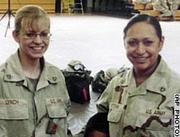Recovered from the Wayback Machine.
Under the banner of equal opportunity, the demand for full integration of women means special treatment for women. They want special breaks-a woman shouldn’t have to perform the same physical tests as a man. This agenda is driven not by women in uniform, but by their civilian advocates, who would never find themselves or their children serving in the military. The most powerful argument against women in combat, however, is not their relative physical strength. It is that decent men protect women in the face of a physical threat. The typical American male cannot pretend that the soldier to the right of him is a man and not a woman. If this bizarre social experiment of moving women closer and closer to the front lines is going to continue, American mothers had better be put on notice that we’ve got to start raising our sons differently. We’ve got to start telling them, “You’d better go hit that girl. Well, what did you do when she called you a name? Did you hit her?”
Kate O’Beirne, Washington Editor of the National Review in interview
I was struck by the ethnic diversity of the photographs of the women who were killed, captured, and injured from the 507 Maintenance Company. Pfc. Lori Piestewa was a Hopi indian, as well as mother of two children. Shoshana Johnson, an African-American, is also a mother, described as kind and friendly, and who loves cooking. And of course, I don’t need to link to anything to describe young, blonde Jessica Lynch, do I? The news is full of her rescue. She and Pfc. Piestewa were roommates and close friends.
‘This is a national security issue,’ said Bartlett. ‘They will rape and torture women in front of the men and break the men. They say that’s a problem with men. I hope we never live in a society in which men are not deferential to women”
The stories about Pfc. Lynch, in particular, have been pretty wild. Real GI Jane stuff, with her firing back until she ran out of bullets. Chances are all of the troops, including Johnson and Piestewa, fired back until they ran out of bullets. Unless they were dead, of course.
‘We join the Marine Corps to be good Marines and fight for our country,’ Malugani said. ‘I recognize that there are physical differences between men and women, but it all comes down to the same thing: whether you can do the job.
‘Everyone is faced with challenges, everybody has weaknesses and everybody has strengths,’ she said. ‘It doesn’t come down to a male-female thing. It’s a human being thing.’
Marine lst Lt. Amy Mulugani, for Stars and Stripes
I think we now have an answer to the age-old question about what will a woman soldier do in war? Just what the men do – their jobs. And trying to stay alive to come home again.
Of course, women are excluded from combat roles in the United States. Unfortunately, this doesn’t block them from combat – just the promotional possibilities associated with combat roles.
They know that there already is a khaki ceiling. The ladder to the top jobs has to include combat positions, yet women are still formally prohibited from most combat units. (This although the lines between deployments is so thin as to be semipermeable; Shoshana Johnson, now a prisoner of war, was sent to Iraq as a cook.) The group that lobbied for a change in the combat ban, the Defense Advisory Committee on Women in the Services, has been weakened by the Bush administration, swayed by conservative critics who howled about its “feminist agenda.” Among the new female voices in the Pentagon is one former master sergeant who opposes women in combat because “women enjoy being protected by men.” She says that the skills needed for fighting are “to survive, to escape and to evade,” adding, “clearly, women don’t have those as a rule.”
Quindlen: Battlefield Rape Is Less a Concern Than It Is in Service at Home
Women enjoy being protected by men.
Unfortunately, coming home means coming home to the very real possibility of sexual assault at the hands of their own commanders and fellow soldiers. I guess it’s just an example of that old male deference and protectiveness paid to women.
In times of peace the powers that be may conveniently forget how many women there now are on the battlefield, how hard they work and how well they perform. Military leaders may forget that if the number of women willing to enlist drops significantly, the ability of America to defend itself will drop significantly, too.
And they may forget how terrible it is that women who must face sexual assault from the enemy as the price of war too often expect to face it from their compatriots in peacetime. As a colonel in the Air Force whose daughter says she was attacked by a fellow cadet told The New York Times: “She knew she could have been captured by an enemy, raped and pillaged in war. She did not expect to be raped and pillaged at the United States Air Force Academy.”
In fact, no soldier should expect to be assaulted by another without significant consequences. Yet that is what has happened. Those who have always been hostile to female soldiers say that this is inevitable, given the atmosphere of esprit with which women interfere, given the machismo that is essential for trained fighting forces. This is insulting to male soldiers. The suggestion is that they are always one beer away from a sexual assault, no more able to control their violent impulses than an attack dog.
…
As their sisters did in Desert Storm, many will return from the Middle East, having served in combat despite the ban, with an official wink and a nod. Maybe it’s the same wink and a nod you get after you’ve been pinned down and penetrated by a fellow cadet, the one that says you have to go along to get along.Quindlen: Battlefield Rape Is Less a Concern Than It Is in Service at Home
(Thanks to Norm and Joseph Duemer for links to stories)




